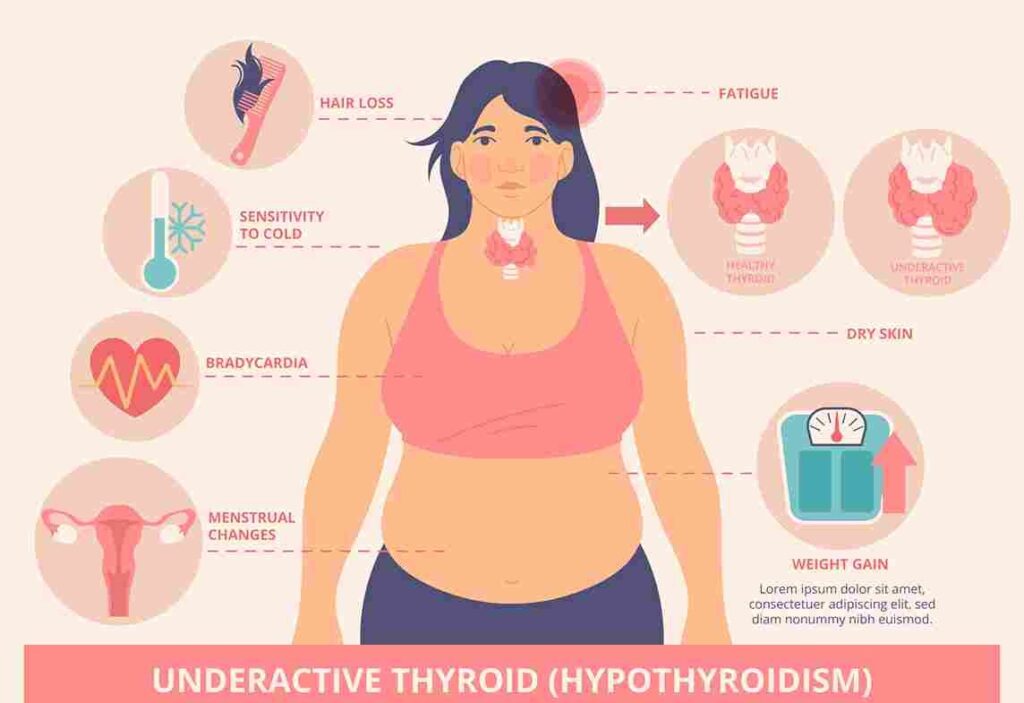The thyroid gland produces hormones that play crucial roles in different systems of the body. When your thyroid makes too much or too little of these hormones, it’s called a thyroid disease.
The thyroid gland is a small organ located in the front of the neck, encased around the windpipe or trachea. It is a butterfly-shaped organ that plays an essential role in regulating various bodily functions. However, when the thyroid gland malfunctions, it can lead to thyroid disorders, which can have a significant impact on an individual’s overall well-being. In this blog, we will explore the different types of thyroid disorders, and their common symptoms, and delve into the details of treatment approaches in managing these conditions.
When your thyroid doesn’t work correctly, it can impact your entire body. If your body makes too much thyroid hormone, you can develop a condition called hyperthyroidism. If your body makes too little thyroid hormone, it’s called hypothyroidism.
Types of Thyroid Disease:
- Hypothyroidism – In this condition, thyroid stimulating hormone (TSH) levels get high and thyroxine (T3) or triiodothyronine (T4) get low.
- Hyperthyroidism – It occurs when there is an excess production of the thyroid hormone. In this condition, thyroid stimulating hormone (TSH) levels get low and thyroxine (T3) or triiodothyronine (T4) are elevated.
Sign and Symptoms of Thyroid Disease:
In Hyperthyroidism, you may experience:
- Palpitations
- Hair loss
- Difficulty in concentration
- Anxiety
- Heat intolerance
In Hypothyroidism, you may experience:
- Fatigue
- Weight gain
- Swelling over feet & face
- Hoarseness of voice
- Cold intolerance

Treatment Options for Thyroid Disease:
Here are a few things you can do to overcome these thyroid conditions.
- Lifestyle Management:
It plays a significant role in managing thyroid hormones and minimising their symptoms. These include maintaining stress, maintaining a healthy diet, and getting regular exercise.
- Thyroid Disease friendly-diets
Foods to avoid in thyroid: Foods that contain goitrogens such as soya products like tofu. Brassica vegetables such as cabbage, cauliflower, and broccoli, are to be avoided when you have a thyroid disorder.
Food to eat in thyroids: Foods that contain sufficient iodine such as dairy products. Eat selenium-rich food such as sunflower seeds, brown rice, and yoghurt because selenium enhances thyroid function.
2. Herbal Remedies:

Ayurvedic practitioners recommend specific herbs such as ashwagandha, guggul, Brahmi, and shilajit, which have been traditionally used to support thyroid health. These herbs are believed to have rejuvenating properties that help balance thyroid function.
3. Yoga Techniques and Pranayama:
Certain yoga asanas (postures) and pranayama (breathing exercises) can positively impact thyroid health. Practices like Sarvangasana (shoulder stand), Matsyasana (fish pose), and Kapalabhati (skull-shining breath) are known to stimulate the thyroid gland and promote its optimal functioning.
4. Panchakarma:
Panchakarma, a set of Ayurvedic detoxification procedures, may be recommended to eliminate toxins and balance the doshas. The therapies involved in Panchakarma, such as Abhyanga (therapeutic oil massage), Swedana (herbal steam therapy), and Shirodhara (a stream of warm oil poured on the forehead), can help support thyroid health.

Conclusion
Thyroid Disease can significantly impact an individual’s quality of life, but with the right approach, it can be effectively managed. By incorporating herbal remedies, lifestyle modifications, and yoga practices into their lives, individuals with thyroid disorders can embark on a journey towards improved well-being and a healthier thyroid function.
The most effective clinic for thyroid disease treatment in Dharwad, Karnataka, is Ayursparsh Clinic and Panchakarma Centre. Contact us if you have any questions about thyroid disorders.
Make sure that you consult with our expert, renowned Ayurvedic physician Dr. Rashmi C. Patil, to identify the ideal course of treatment for your thyroid disease.




